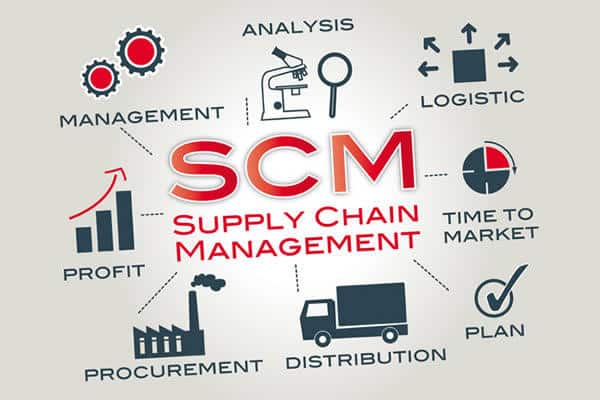The term supply chain management (SCM), in general, means a well-organized and controlled procurement function. But then when we talk about the term, “procurement,” we mean a series of unrelated suppliers chosen at random based on their perceived ability to produce goods at a reasonable price. This may sound a little bit like an exaggeration as it is true that most companies hardly make any effort to coordinate their suppliers or execute coherent supply chain strategies.
However, it is also true that most of them are pretty unaware that the supply chain accounts for a large portion of their overall costs, particularly for companies that outsource manufacturing. Some of these costs include:
- Expenses incurred as a result of handling vendors
- Costs of Resolving quality control problems.
- Costs of logistics
- Sales lost due to late deliveries and so on…
On the other hand, businesses that plan, streamline, and control their supply chains save money on both direct and indirect costs. This increases sales and provides a response to the question, “What is supply chain management and why is it important?”
N.B: Depending on the context, SCM could either mean Supply Chain Managment or Supply Chain Manager.
What Is Supply Chain Management (SCM) and How Does It Work?
The management of the movement of goods and services is referred to as supply chain management. It encompasses all processes that turn raw materials into finished goods. Furthermore, it entails actively streamlining a company’s supply operations. This is to increase consumer satisfaction and achieve a competitive edge in the industry.
SCM also refers to manufacturers’ efforts to design and execute supply chains that are as reliable and cost-effective as possible. On the other hand, supply chains include everything from manufacturing to product creation; with the information systems used to coordinate these activities inclusive.
What is the Process of Supply Chain Management?
Typically, SCM aims to centralize or connect a product’s production, shipping, and distribution. In other words, companies can reduce excess costs and deliver goods to customers quicker by controlling the supply chain. To a large extent, Internal inventories, internal manufacturing, distribution, sales, and company distributor inventories are all under tighter control.
Furthermore, SCM is founded on the concept that virtually any commodity that reaches the market is the culmination of the actions of many entities that make up a supply chain. However, despite the fact that supply chains have been around for a long time, most businesses have only recently recognized them as a valuable addition to their operations.
The supply chain manager (SCM) coordinates the logistics of all facets of the supply chain, which is divided into five sections:
- The strategy or plan
- The originator (of raw materials or services)
- Industrial production (focused on productivity and efficiency)
- Logistics and delivery
- The method of return (for defective or unwanted products)
The supply chain manager strives to keep costs down while minimizing shortages. The work entails more than just logistics and inventory purchases. Supply chain managers, according to Salary.com, “make recommendations to increase productivity, quality, and performance of operations.”
Either way, it is also vital to note that Improvements in productivity and quality have a direct and long-term effect on a company’s bottom line. Supply chain management basically keeps businesses out of the news and out of costly recalls and litigation.
Supply Chain
A supply chain is an interconnected network of people, organizations, services, activities, and technologies. They are often involved in the production and distribution of a product or service. For the most part, the distribution of raw materials from a supplier to a producer begins the supply chain. It, however, finishes with the delivery of the end product or service to the customer.
In other words, SCMs are often in charge of every aspect of a company’s product or service, from conception to sale.
Proper supply chain management will boost sales, lower prices, and affect a company’s bottom line. This is because there are so many locations in the supply chain that gain value through efficiencies or lose value through increased expenses.
What Is the Importance of SCM?
More often than not, the success of SCM often has a direct impact on the overall success of the company. Companies with extended global supply chains are projected to have between 80 percent and 90 percent of their costs wrapped up in their supply chains from a cost management standpoint. SCM is also essential due to the increased complexity of modern supply chains caused by global sourcing.
In recent times, customers have become more competitive. They expect stores to have what they want in stock or they will leave; often resulting in a missed sale. They expect on-time delivery when they order goods online. And also simple return procedures for unnecessary purchases. On the other hand, tons of manufacturers depend on just-in-time (JIT) manufacturing strategies. This requires products to be delivered not only on time but also in the exact quantity needed.
So retailers must find out how to balance the ever opposing demands of brick-and-mortar and online retailing. Businesses need supply chains that are versatile and adaptable. They should also be able to react quickly to opportunities presented by rapidly evolving customer habits.
SCM Example
Walgreens Boots Alliance Inc., realizing the value of SCM to its market, based its efforts in 2016 on transforming its supply chain. The business runs one of the largest pharmacy chains in the country. However, behind the scenes, it needs to effectively monitor and revise its supply chain. This helps them remain ahead of emerging trends and add value to their bottom line.
According to statistics, Walgreens had started investing in the technology part of its supply chain as of July 5, 2016. It introduced a forward-looking SCM that synthesizes relevant data and employs analytics to predict consumer buying activity; after which it works its way back up the supply chain to satisfy the anticipated demand.
For example, the company may predict flu patterns, allowing it to reliably forecast required inventory for over-the-counter flu treatments, resulting in a waste-free supply chain.
Eventually, the organization minimizes excess inventory and all related expenses, such as warehousing and transportation, by implementing this SCM.
Important Aspects of SCM Strategy
While each company’s supply chain strategy is unique, there are a few common elements that must be considered. Some of them include;
#1. The structure of the supply chain network:
Physical structures, such as production plants, warehousing, outlets, and customer sites, as well as logistics and organizational theory, are all taken into account when determining where and how each is organized and managed.
#2. Legal and ethical standards:
Identify legal procurement standards as well as acceptable ethical standards to ensure that the company adheres to its corporate responsibility and environmental commitments.
#3. Supply chain software and technology:
This talks about the adoption of systems to control stocks, such as barcoding or IoT devices for monitoring locations and movements. Software applications that provide supply chain visibility and the degree of software integration with other corporate structures are also important considerations.
#4. S&OP policies:
Since the supply chain does not exist in a vacuum, decisions and plans should be consistent with the organizational culture and expressed in the same financial language.
#5. Supplier profiles:
The plan should specify who the company works with and what systems suppliers must use to handle product quality and deliveries.
Essential TAKEAWAYS
- SCM is the centralized management of the flow of goods and services, and it encompasses all processes that transform raw materials into finished goods.
- Companies can reduce excess costs and deliver goods to customers quicker by controlling the supply chain.
- Supply chain management keeps businesses out of the news and out of costly recalls and litigation.
What Is Supply Chain Management in Simple Words?
Supply chain management (SCM) is the management of the flow of goods, information, and money related to a product or service, from getting the raw materials to delivering the product to its final destination.
What Does Supply Chain Management Do?
Supply chain management (SCM) involves analytical and practical thinking. The purpose is to regulate the flow of goods and services from raw material suppliers through consumer consumption of the end product. It benefits both businesses and customers when done correctly.
What Are the Four 4 Stages of Supply Chains?
What stages of your supply chain should you be focused on right now?
- Integration . Integration begins with strategic planning and continues via communications, information exchange, data analysis, and storage
- Operations
- Purchase
- Distribution
What Are 5 Key Roles in the Supply Chain?
The following are the five functions of supply chain management:
- Purchasing. Purchasing is the first role of supply chain management.
- Operational procedures.
- Logistics
- Resource Management
- Information Workflow.
What Are the 5 Main Goals of Supply Chain Management?
The following are the top five supply chain management goals:
- Ensure effectiveness.
- Logistics should be optimized and standardized.
- Concentrate on enhancing quality.
- Increase your adaptability.
- Keep track of your financial success.







1 comment
merci pour tous ces bon détails et ces précisions sur la supply chain management